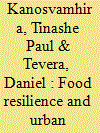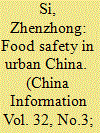|
|
|
Sort Order |
|
|
|
Items / Page
|
|
|
|
|
|
|
| Srl | Item |
| 1 |
ID:
114311


|
|
|
|
|
| Publication |
2012.
|
| Summary/Abstract |
The future bioenergy crop potential depends on (1) changes in the food system (food demand, agricultural technology), (2) political stability and investment security, (3) biodiversity conservation, (4) avoidance of long carbon payback times from deforestation, and (5) energy crop yields. Using a biophysical biomass-balance model, we analyze how these factors affect global primary bioenergy potentials in 2050. The model calculates biomass supply and demand balances for eleven world regions, eleven food categories, seven food crop types and two livestock categories, integrating agricultural forecasts and scenarios with a consistent global land use and NPP database. The TREND scenario results in a global primary bioenergy potential of 77 EJ/yr, alternative assumptions on food-system changes result in a range of 26-141 EJ/yr. Exclusion of areas for biodiversity conservation and inaccessible land in failed states reduces the bioenergy potential by up to 45%. Optimistic assumptions on future energy crop yields increase the potential by up to 48%, while pessimistic assumptions lower the potential by 26%. We conclude that the design of sustainable bioenergy crop production policies needs to resolve difficult trade-offs such as food vs. energy supply, renewable energy vs. biodiversity conservation or yield growth vs. reduction of environmental problems of intensive agriculture.
|
|
|
|
|
|
|
|
|
|
|
|
|
|
|
|
| 2 |
ID:
186827


|
|
|
|
|
| Summary/Abstract |
This paper draws on the results of a mixed-methods study that investigates whether urban gardener networks in a low-income neighbourhood in Cape Town are contributing to urban agriculture and food resilience. The findings reveal that the urban gardeners are organised into largely fragmented informal networks whose primary goal is to enhance food resilience. While these networks have succeeded in disseminating information, they have not been able to empower urban gardeners in low-income neighbourhoods to access resources beyond non-governmental organisation assistance. Also, the home gardeners have not succeeded to reorganise, both in terms of form and function, in order to overcome the underlying stress factors, such as poverty, that continue to weaken home gardens in the Cape Flats area. We argue that engagement with urban gardener networks can be a useful way of framing the debate on food resilience in low-income areas of African cities.
|
|
|
|
|
|
|
|
|
|
|
|
|
|
|
|
| 3 |
ID:
162348


|
|
|
|
|
| Summary/Abstract |
Food safety has become an increasingly pressing sociopolitical issue in China due to the outbreak of food safety scandals since the 2000s. Existing studies have highlighted the socio-economic context of this issue, its drivers and implications. Yet, few studies have examined the perceptions of food safety conditions and strategies undertaken by consumers in their daily lives to cope with the challenge. Based on a city-wide survey of 1210 households and 36 interviews in Nanjing, China, this research adopts an ‘everyday’ perspective of analysis to investigate Nanjing residents’ perceptions of, and strategies to cope with, the food safety challenge. Perceptions include the severity of the food safety problem, the least safe foods, as well as causes and responsibilities. Coping strategies include various approaches to food access and food preparation. This article also compares the validity of potential sources of trust in food. On the one hand, the study demonstrates how the structural changes in China’s food system (i.e. chemical intensive food production and elongated food supply chains) constitute the major problems and causes of food safety issues. On the other hand, it reveals the considerable latitude within which Nanjing residents proactively exercise their agency when facing food safety challenges.
|
|
|
|
|
|
|
|
|
|
|
|
|
|
|
|
|
|
|
|
|